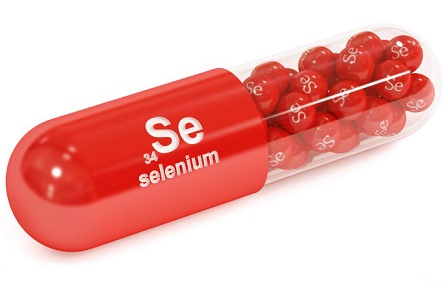Nikhil Prasad Fact checked by:Thailand Medical News Team Oct 27, 2024 5 months, 2 weeks, 3 days, 1 hour, 34 minutes ago
Medical News: Selenium, once feared for its toxicity, is now being hailed as a vital mineral with incredible potential in the fight against cancer. Researchers from the Department of Medical Pathomorphology at the Medical University of Białystok-Poland have published a comprehensive study on the remarkable effects of selenium supplementation and the emerging role of nanoselenium in cancer treatment. This
Medical News report aims to shed light on the key findings from the study and explain the importance of selenium in preventing and treating cancer for the general public.
 Selenium’s Potential in Fighting Carcinogenesis
Understanding Selenium: From Toxicity to Healing
Selenium’s Potential in Fighting Carcinogenesis
Understanding Selenium: From Toxicity to Healing
Discovered in 1817, selenium (Se) was initially considered a dangerous substance. However, in the 1950s, scientists began to understand its benefits. Selenium is essential for many bodily functions, including protecting cells from damage, detoxifying heavy metals, supporting the immune system, and possibly preventing cancer.
How Selenium Fights Cancer
One of the most exciting aspects of selenium is its ability to combat cancer. Research has shown that low levels of selenium in the body are associated with a higher risk of developing cancers, including those of the colon, lung, and prostate. Selenium acts in two significant ways to protect against cancer:
-Antioxidant Action: Selenium is a powerful antioxidant, meaning it helps the body fight off harmful molecules called free radicals, which can damage cells and lead to cancer. It works through a group of proteins called glutathione peroxidases (GPX), which protect cells from oxidative damage.
-Inhibiting Cancer Cell Growth: Selenium has been shown to slow down the growth of cancer cells by influencing genes that regulate cell death and survival. Specifically, it can affect the tumor suppressor gene p53 and the apoptosis suppressor gene Bcl-2, which are critical in controlling cancer progression.
Nanoselenium: The Future of Cancer Treatment?
Nanomedicine, the use of nanotechnology in medicine, is transforming how we approach cancer treatment, and selenium is playing a leading role. Nanoselenium, a form of selenium that is engineered at the nanoscale, has shown promise in targeting cancer cells more effectively while minimizing harm to healthy cells.
Nanoselenium is less toxic than traditional selenium supplements and has higher bioactivity, meaning it can be more easily absorbed by the body. Researchers from the Medical University of Białystok highlight how selenium nanoparticles (SeNPs) can selectively attack cancer cells, especially when combined with other treatment modalities like chemotherapy or radiation therapy. This could significantly reduce the side effects commonly associated with cancer treatments.
Key Findings from the Study
The research conducted by Monika Maleczek, Joanna Reszec-Giełażyn, and Katarzyna Szymulewska-Konopko provides essential insights into how seleniu
m and nanoselenium could revolutionize cancer care. Some of the key findings include:
-Reduced Cancer Risk: Selenium supplementation has been linked to a lower risk of developing certain cancers. For example, in one study group that received selenium-enriched salt, the incidence of primary liver cancer dropped by 35%.
-Prostate Cancer: Selenium supplementation was found to reduce the incidence of prostate cancer by 63% in a study that followed male participants for over six years.
-Colon and Breast Cancer: Selenium was inversely associated with the risk of developing both colon and breast cancer. These results emphasize selenium’s potential role in preventing cancer, especially in populations with low dietary selenium intake.
-Enhanced Treatment Efficacy: Nanoselenium, when combined with other cancer treatments, can enhance the effects of chemotherapy or radiotherapy. The research highlights how selenium nanoparticles, particularly when paired with agents like transferrin or folic acid, can significantly boost anticancer efficacy.
Selenium and Its Role in Modern Medicine
Apart from cancer prevention, selenium plays a critical role in supporting overall health. It helps regulate the immune system, maintains thyroid function, and protects against cardiovascular diseases and neurodegenerative conditions. Despite its many benefits, selenium deficiency is still common in many parts of the world, particularly in regions where the soil is low in selenium.
Ensuring an adequate intake of selenium - through diet or supplementation - could be vital not just for cancer prevention but for overall well-being. Foods like Brazil nuts, fish, and eggs are rich in selenium, but for people living in selenium-deficient areas, supplements might be necessary.
The Promise of Future Research
While the study provides strong evidence for selenium’s anticancer properties, it also acknowledges the need for further research. Selenium’s effectiveness can vary depending on the type of cancer, the stage of the disease, and the form of selenium used. More studies are needed to determine the optimal selenium dosage and to fully understand how nanoselenium can be integrated into cancer therapies.
Additionally, the researchers stress the importance of continued studies on selenium’s role in cell death. Selenium seems to influence multiple forms of cell death, including apoptosis (programmed cell death), ferroptosis (iron-dependent cell death), and pyroptosis (inflammatory cell death), but the exact mechanisms are not yet fully understood.
Conclusion: A New Era in Cancer Treatment?
The study findings offer hope that selenium, particularly in its nanoparticle form, could play a vital role in the future of cancer treatment. As researchers continue to explore its potential, it’s clear that selenium has unique properties that can prevent cancer and enhance existing treatments. The study highlights the importance of adequate selenium intake, whether through diet or supplementation, in reducing cancer risk.
While selenium’s role in cancer prevention and treatment is promising, it is essential for further research to optimize its use. Scientists must continue to refine how selenium, especially nanoselenium, can be harnessed safely and effectively. As with all medical treatments, it’s important to consult healthcare professionals before starting any new supplementation.
The study findings were published in the peer-reviewed: International Journal of Molecular Sciences.
https://www.mdpi.com/1422-0067/25/20/11285
For the latest Cancer News, keep on logging to Thailand
Medical News.
Read Also:
https://www.thailandmedical.news/news/covid-19-new-american-researchers-uncover-the-importance-of-selenium-and-glutathione-supplementation-in-covid-19-as-sars-cov-2-mpro-targets-these
https://www.thailandmedical.news/news/selenium-helps-to-reduce-hiv-viral-loads-and-also-prevent-cd4-levels-from-declining
